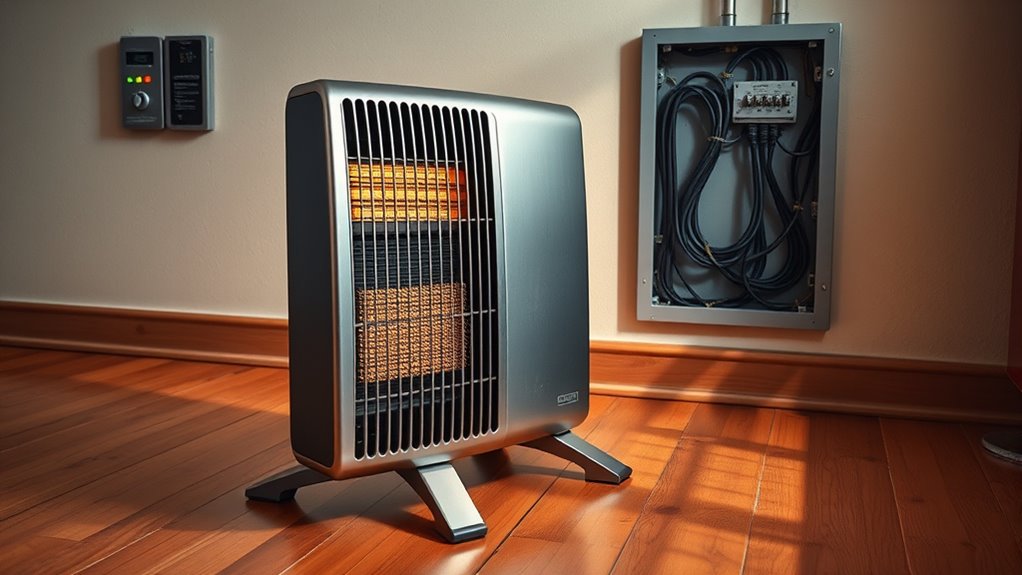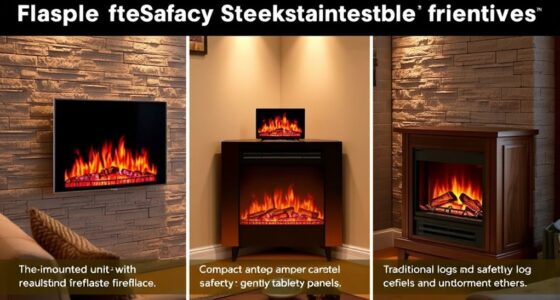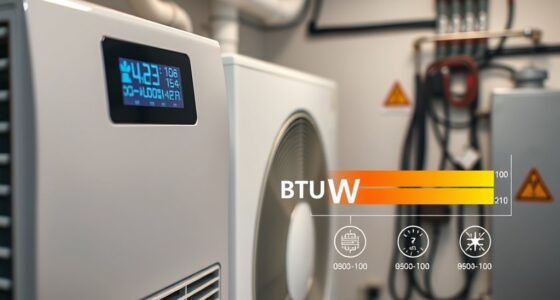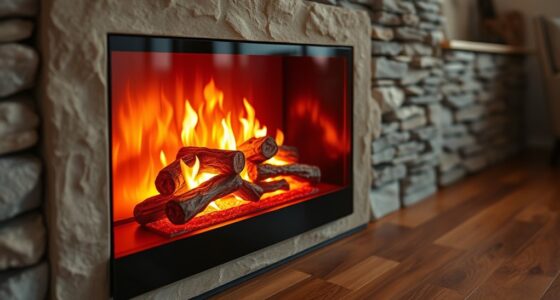When choosing a space heater, you may encounter hidden costs like installation, permits, and compliance violations that can lead to fines or safety hazards. Different heater types require specific electrical wiring, which might mean upgrading circuits or paying for inspections. Energy-efficient features can also add long-term maintenance costs. To avoid these pitfalls, understand local codes and standards upfront. Keep exploring to learn how to guarantee your heater remains safe, legal, and cost-effective.
Key Takeaways
- Non-compliant heaters may incur fines, installation delays, or require costly modifications to meet regional safety and electrical standards.
- Choosing the wrong heater type can lead to increased energy bills due to inefficiency or improper sizing for the space.
- Failing to obtain necessary permits or inspections can result in legal penalties and potential safety hazards.
- Energy-efficient features might require expensive maintenance, specialized parts, or upgrades that offset initial savings.
- Ignoring local building codes and zoning laws during installation risks property damage, neighbor disputes, or future legal liabilities.
Understanding Different Types of Space Heaters
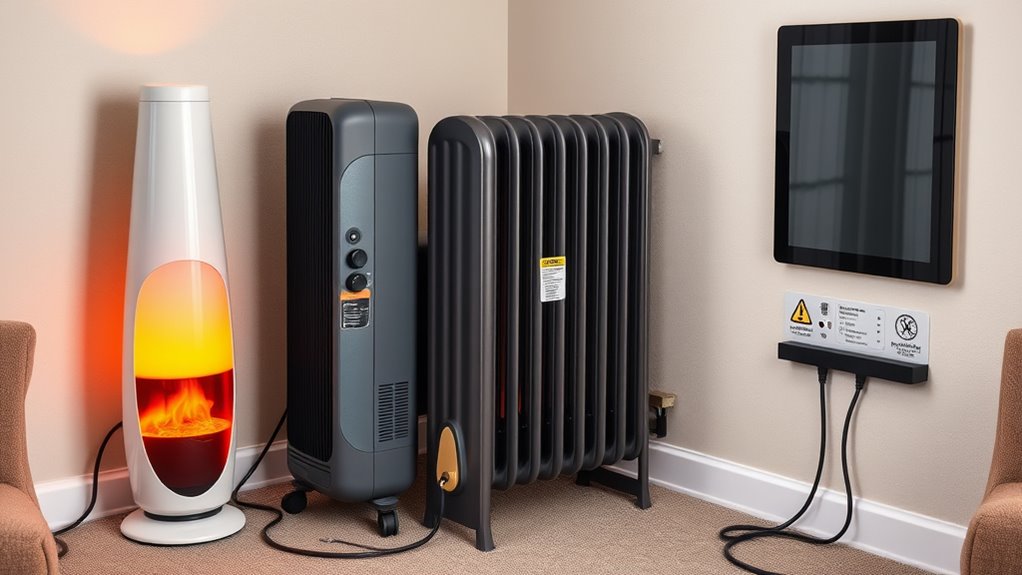
Understanding the different types of space heaters is essential because each one varies in how it heats a space, costs to operate, and safety features. Knowing the various space heater types helps you choose the right option for your needs. For example, ceramic heaters use heating elements made of ceramic and are known for quick heating and safety, while infrared heaters emit heat directly to objects and people, offering efficient warmth. Convection heaters warm the air, which can be cost-effective for larger spaces, but may take longer to heat up. Oil-filled radiators provide consistent heat and are quiet but tend to be slower to warm up. Recognizing these operational differences guarantees you select a heater that matches your space and budget, while also considering safety and efficiency. Additionally, understanding space heater safety standards can help prevent accidents and ensure compliance with local codes.
Electrical Requirements and Installation Challenges
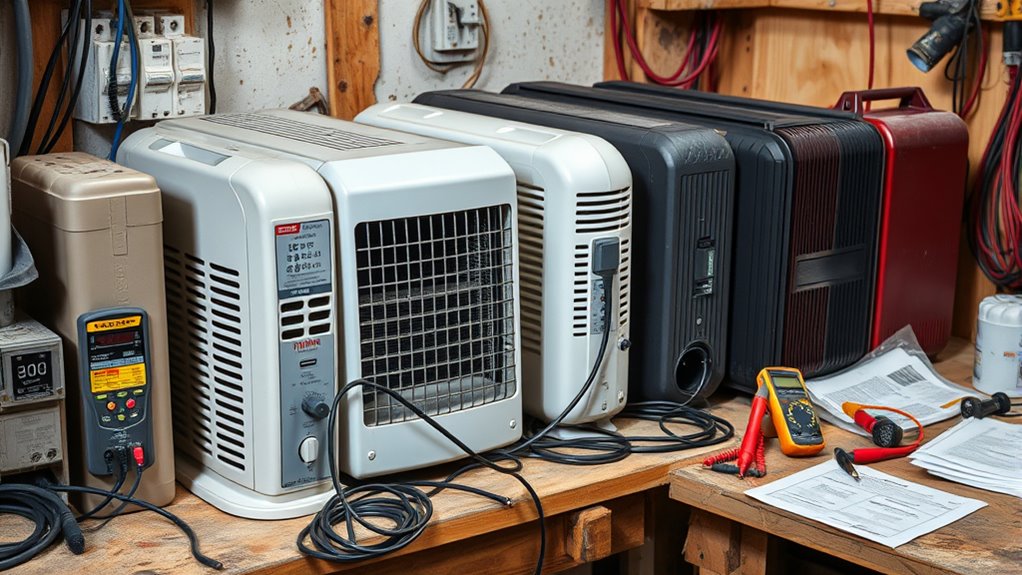
Before choosing a space heater, you need to consider its electrical power demands to ensure your home’s wiring can handle it. Installation might also require upgrades to meet local code requirements, which can add unexpected costs. Ignoring these factors could lead to safety issues or costly renovations down the line.
Electrical Power Demands
Electrical power demands vary considerably among different types of space heaters, often posing installation challenges. High-worse models can cause power surges or circuit overloads if your electrical system isn’t equipped. To avoid issues, consider these key points:
- Check your circuit capacity—many heaters require a dedicated circuit with sufficient amperage.
- Be aware of power surges—an abrupt spike can trip breakers and damage equipment.
- Ensure proper wiring—undersized wiring can lead to overheating and fire hazards.
- Understanding juice extraction and electrical requirements can help anticipate and prevent overloads.
If your home’s electrical system can’t handle the load, you risk circuit overloads or frequent outages. Upgrading your wiring or adding dedicated circuits may be necessary, but neglecting these demands can lead to costly repairs or safety hazards. Proper planning is essential to prevent hidden costs associated with electrical power demands.
Installation Code Compliance
Installing a space heater isn’t just about plugging it in; you also need to guarantee it meets local electrical codes. Failure to do so can lead to costly misapplications that compromise safety and incur fines. Many assume that simply following manufacturer instructions ensures compliance, but this is a common compliance misconception. Electrical requirements vary by region, and improper installation can void warranties or cause electrical hazards. To avoid these hidden costs, you must verify that your setup adheres to all code specifications, including proper wiring, circuit capacity, and grounding. Overlooking regional electrical standards can result in expensive repairs or replacements down the line. Ensuring code compliance from the start saves you money and protects your property and loved ones.
Safety Standards and Certification Processes
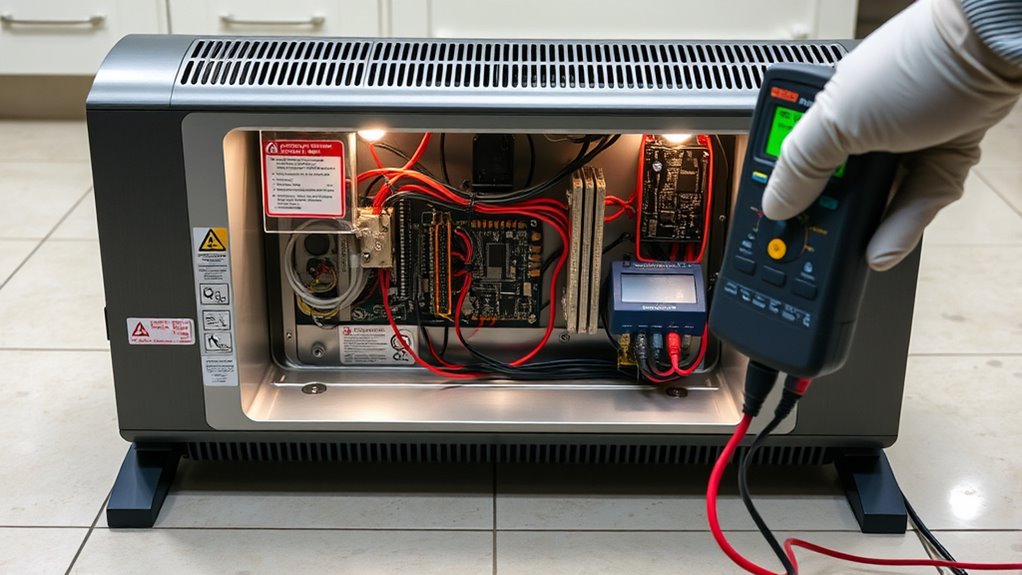
Understanding safety standards and certification processes is essential when choosing a space heater, as these regulations help guarantee your device operates safely and reliably. Product certification confirms that a heater meets established safety standards, reducing the risk of hazards. When evaluating options, consider these key aspects: 1. Verify that the heater has appropriate product certification from recognized agencies. 2. Ensure it complies with safety standards relevant to your region, such as UL or ETL listings. 3. Check for clear documentation demonstrating adherence to safety regulations before purchase. Additionally, understanding the significance of dream symbols can help you interpret potential subconscious concerns related to safety or decision-making in your home environment.
Local Building Codes and Zoning Regulations

Before setting up a space heater, it’s essential to verify your local building codes and zoning regulations, as these rules can restrict or specify how and where you can use certain heating devices. Zoning restrictions may limit the types of heaters allowed in residential or commercial areas, especially if they emit significant heat or noise. Additionally, property line setbacks can impact where you place your heater, requiring a specific distance from property boundaries to prevent fire hazards or disturbances to neighbors. Ignoring these regulations can lead to fines or the need to relocate your heater later. Always review local ordinances before installation to ensure compliance, avoid costly modifications, and ensure safe, legal operation of your space heater. Understanding security zones can also help in assessing potential risks associated with heater placement and security.
Permits and Inspection Costs
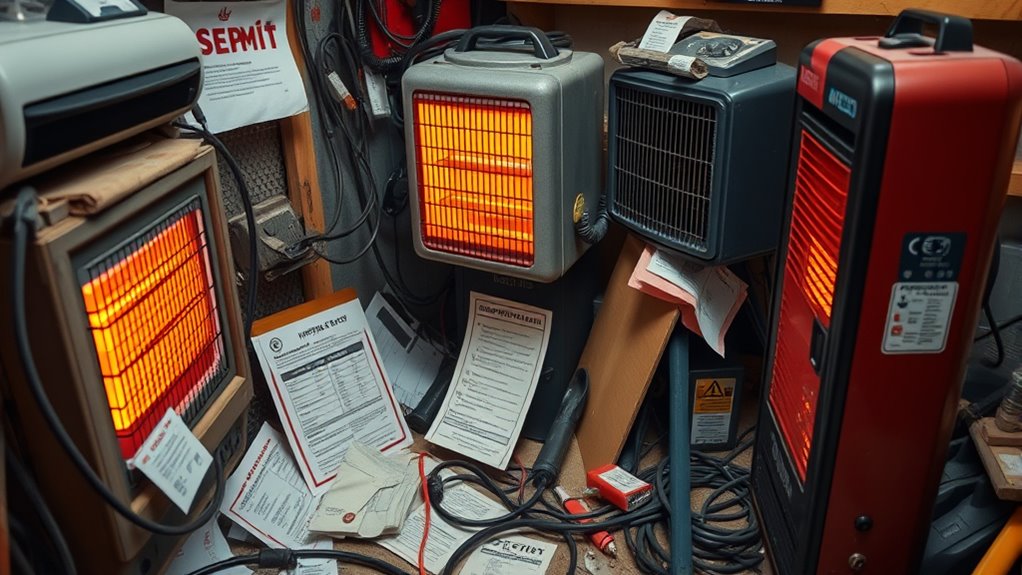
Securing the necessary permits and passing inspections can add unexpected costs to your space heater setup. Permit fees vary depending on your location and the complexity of the installation, often ranging from minimal to substantial sums. Inspection costs are equally variable, covering the review process to ensure compliance with safety standards. To avoid surprises, consider these factors: 1. Permit fees associated with local building departments 2. Costs for mandatory inspections before approval 3. Potential fees for re-inspections if issues are found which can impact overall project costs.
Potential Penalties for Non-Compliance
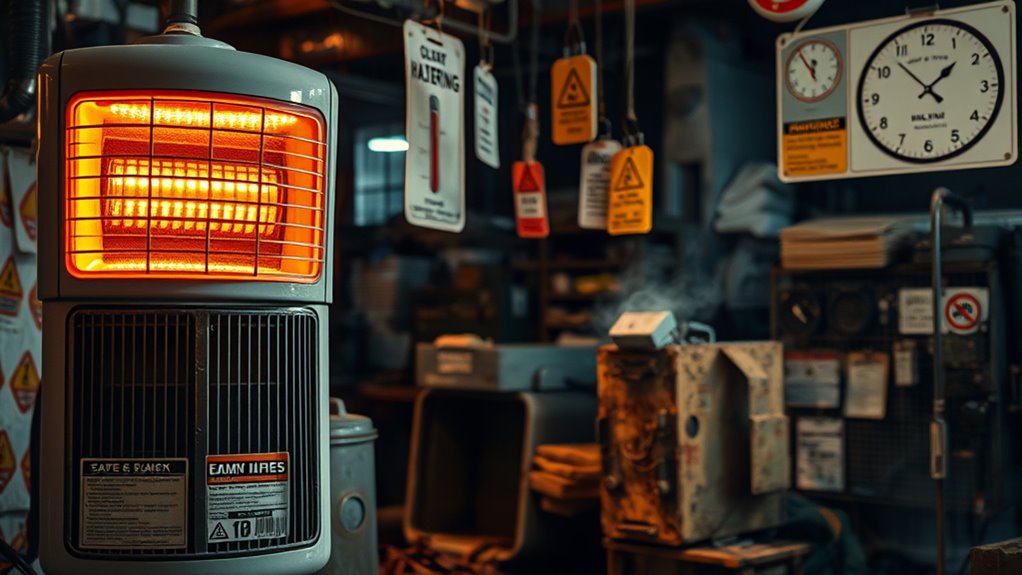
If you ignore local regulations, you could face fines or legal action that cost you more than the heater itself. Non-compliance risks not only financial penalties but also potential legal repercussions that can disrupt your plans. Understanding these risks helps you avoid costly violations and stay within the law. Additionally, being aware of privacy and cookie policies can help you make informed decisions about your online privacy while researching regulations.
Fines for Violations
Are you aware that violating space heater regulations can result in hefty fines? Non-compliance can lead to significant financial penalties that add up quickly. These fines often include:
- Permit fees that weren’t paid before installation or use.
- Inspection costs for correcting violations or re-evaluations.
- Legal penalties for operating without proper documentation or safety measures.
- Ignoring affiliate disclosure requirements can also result in penalties if not properly disclosed to users.
Failing to meet code requirements can also trigger recurring fines until issues are resolved. Keep in mind, authorities may escalate penalties for repeated violations, increasing your costs. To avoid these fines, ensure you secure all necessary permits, pay inspection fees promptly, and adhere strictly to safety standards. Staying compliant not only saves money but also prevents potential shutdowns and legal complications.
Legal Repercussions Risks
Failure to comply with space heater regulations can lead to serious legal consequences that go beyond just fines. You could face liability concerns if someone gets injured or property is damaged due to non-compliant equipment. These legal issues might trigger lawsuits or claims that threaten your business or personal assets. Additionally, non-compliance can impact your insurance coverage, leading to denied claims or higher premiums. Insurance implications are significant because insurers may consider violations as increased risk, which can leave you financially vulnerable. Ignoring safety standards and codes not only exposes you to regulatory penalties but also increases your legal exposure. Staying compliant helps you avoid these risks and safeguards your reputation, finances, and peace of mind. Moreover, understanding the divorce laws related to property and asset division can help ensure that your financial interests are protected during legal proceedings.
Compliance Cost Penalties
Non-compliance with space heater regulations can lead to hefty financial penalties that considerably impact your budget. Ignoring compliance costs raises penalty risks, which can include fines, legal fees, and equipment shutdowns. To avoid these issues, you need to understand the potential consequences:
- Significant fines that can reach thousands of dollars, affecting your financial stability.
- Increased legal and administrative costs associated with regulatory violations.
- Operational disruptions due to mandated shutdowns or product recalls.
Hidden Costs of Energy Efficiency Features
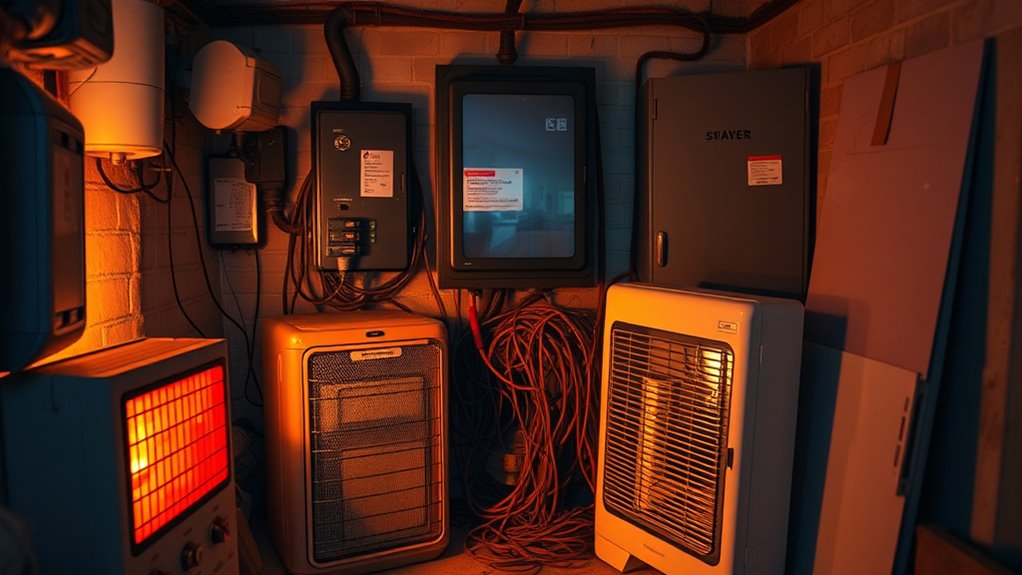
Although energy efficiency features can reduce long-term operating costs, they often come with hidden expenses that may catch you off guard. For example, you might miss out on valuable energy saving rebates if your heater doesn’t meet specific standards, or you could face higher maintenance expenses due to complex components designed to boost efficiency. These features sometimes require specialized parts or frequent servicing, increasing your overall costs. Additionally, some energy-saving technologies may not be compatible with existing systems, leading to costly upgrades. While the initial investment seems worthwhile, these hidden costs can diminish the expected savings. For instance, some advanced features may involve hydrocolloid technology that requires specific handling and maintenance, adding to your expenses. To avoid surprises, thoroughly research the long-term implications of energy efficiency features before committing to a particular space heater.
Tips for Staying Within Legal and Financial Boundaries

To stay within your legal and financial boundaries when choosing a space heater, it’s vital to start by researching local regulations and safety standards. This helps avoid costly fines and safety issues. Consider these steps:
Research local safety standards to choose a compliant, cost-effective space heater.
- Consult local building codes and safety guidelines to ensure compliance.
- Seek legal consultation if you’re unsure about regulations or permits.
- Implement cost saving strategies, like choosing energy-efficient models that meet legal standards, reducing long-term expenses.
Frequently Asked Questions
How Do Space Heater Codes Differ Across Various Regions?
You’ll notice that regional standards and code variations substantially impact space heater requirements across different areas. Some regions enforce stricter safety and energy efficiency standards, requiring specific certifications or features. It’s essential to check local building codes before installing a heater, as they can vary widely. By understanding these regional standards, you can guarantee compliance, avoid fines, and select a heater that’s both safe and suitable for your specific location.
What Are Common Hidden Costs During Space Heater Installation?
You might think installation is straightforward, but hidden costs often lurk beneath. Installation challenges can surprise you with unexpected labor fees or permit issues, while hidden maintenance costs may arise from inefficient models or future repairs. These hidden expenses add up quickly, making initial savings seem minimal. To avoid this, plan for potential hurdles, choose quality equipment, and consult professionals to guarantee compliance and minimize surprises down the line.
How Can I Verify a Space Heater’s Compliance Documentation?
You can verify a space heater’s compliance by checking its product certification labels, which indicate it meets safety standards set by recognized organizations. Always review the manufacturer’s documentation or visit their website for certification details. Confirm the product displays symbols like UL, ETL, or CSA marks, confirming it adheres to safety standards. Contact the manufacturer directly if you’re uncertain about the documentation’s authenticity, ensuring your heater is compliant and safe.
Are There Financial Incentives for Using Energy-Efficient Heaters?
Yes, you can access financial incentives like rebate programs and tax credits when you choose energy-efficient heaters. These incentives help offset the initial cost, making it more affordable to upgrade your heating system. Check local and federal programs, as they often offer rebates or tax credits for eco-friendly appliances. By taking advantage of these, you save money while reducing your energy consumption and environmental impact.
What Legal Risks Are Associated With Non-Compliance?
Non-compliance with safety codes is like sailing into treacherous waters—you risk hitting hidden legal rocks. You face liability concerns if accidents occur, and insurance implications could leave you financially exposed. Authorities might impose fines or demand costly modifications. Staying compliant protects you from legal trouble, safeguards your assets, and ensures your space heater operates safely, giving you peace of mind and avoiding potentially devastating legal and financial consequences.
Conclusion
Managing space heater codes and costs might seem overwhelming, but staying informed saves you money and stress. Don’t assume compliance is optional; ignoring regulations can lead to hefty fines or safety hazards. While upgrading to energy-efficient models costs more upfront, it pays off in lower bills and peace of mind. By understanding requirements now, you’ll avoid costly surprises later—making your heating safer, legal, and more economical in the long run.
